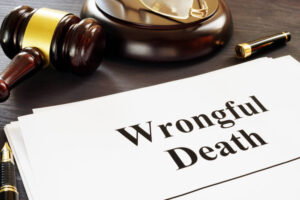Losing a loved one because of someone else’s negligence or wrongful actions can leave you with intense grief and an overwhelming sense of injustice. An unexpected death can take a serious toll on your family’s emotional and financial well-being. In addition to the significant emotional distress that accompanies your loss, you may struggle with outstanding medical bills, funeral costs, and the loss of income.
An Altoona wrongful death lawyer from Marcus & Mack could help you pursue a financial recovery that will ensure stability for your future. If your loved one’s death occurred due to the negligence of another person or entity, contact a compassionate personal injury attorney at our firm for a free consultation.
 Since we first opened our doors in 1977, the attorneys at Marcus & Mack have provided dedicated, personalized representation to injured clients and their families throughout Pennsylvania.
Since we first opened our doors in 1977, the attorneys at Marcus & Mack have provided dedicated, personalized representation to injured clients and their families throughout Pennsylvania.
Driving by a mission to deliver unmatched client service, we promise to:
You can rely on us to handle all aspects of your claim, and you can rest easy knowing a knowledgeable, skilled legal professional is working for you.
Our lawyers work on a contingency fee basis, so you won’t have to worry about paying anything upfront to retain the quality, effective legal representation you need. We only accept attorney fees if we obtain monetary compensation for you.
To learn more about how we can help you obtain justice and the financial compensation you need following the preventable and untimely loss of a close family member, contact Marcus & Mack today for a free case evaluation.
Many common scenarios that may give rise to a wrongful death claim, including:
Other scenarios could lead to a wrongful death claim as well, including acts of violence. If you lost a loved one and believe a specific person or entity is responsible, contact a personal injury attorney near you to discuss your case at no cost.
Proving wrongful death in Altoona involves demonstrating that another party’s negligence, recklessness, or intentional misconduct caused the person’s death. To establish a successful wrongful death claim, you need to work with an attorney who can collect evidence to support the key elements of the case:
Your attorney must show that the defendant owed a duty of care to the deceased person. This duty varies depending on the circumstances, such as a duty to drive safely in a car accident or a duty to maintain a safe environment in a premises liability case.
Your lawyer needs to demonstrate that the defendant breached their duty of care. This could involve proving negligence, recklessness, or intentional misconduct on the part of the responsible party.
Your attorney must establish a direct link between the defendant’s breach of duty and the death of your family member. You need to show that the defendant’s actions were a substantial factor in causing the fatal injuries.
Your lawyer must provide evidence that the death was a direct result of the defendant’s actions.
To prove these elements, your attorney must:
Your attorney may consult with experts, such as accident reconstruction specialists, medical professionals, or other relevant experts who can provide testimony supporting your case. Expert opinions can carry significant weight in establishing the elements of the claim.
Proving wrongful death can be a complex process, and the specifics of the case will depend on the circumstances surrounding the death. Enlisting the services of an attorney is crucial to ensure that you understand the legal requirements and have the support needed to build a compelling case.
 Wrongful death cases are similar to other personal injury claims in that it must be determined who is liable. For example, a negligent driver in a truck accident case will be liable for injuries, whether minor or fatal. However, the main difference between a wrongful death claim and other personal injury claims is the party who brings the claim.
Wrongful death cases are similar to other personal injury claims in that it must be determined who is liable. For example, a negligent driver in a truck accident case will be liable for injuries, whether minor or fatal. However, the main difference between a wrongful death claim and other personal injury claims is the party who brings the claim.
In a typical personal injury case, the injured party is seeking compensation for their own injuries, damages, and losses. The injured person is the plaintiff, and they are pursuing a claim to recover damages such as medical expenses, lost wages, pain and suffering, and other related costs.
In a wrongful death case, the victim has died because of the defendant’s actions, and the surviving family members or the estate of the deceased person pursue the claim. The case seeks compensation for the losses suffered due to the death of their loved one, including funeral expenses, loss of financial support, and emotional distress.
There are two types of cases arising from the death of an accident victim.
In Altoona, and throughout Pennsylvania, the right to bring a wrongful death claim is typically governed by Pennsylvania state law. The specific rules and eligibility criteria can vary, but generally, the following parties may have the legal standing to bring a wrongful death claim:
If you have any doubts or questions regarding who can bring a wrongful death action in your case, consult an attorney familiar with the wrongful death laws in Altoona to understand the eligibility criteria and navigate the legal process.
In an Altoona wrongful death claim (or any wrongful death claim in Pennsylvania), the compensation you can receive falls into several categories. These aim to address both the financial and emotional impact of the loss on the deceased’s family and estate.
These compensate for the financial losses directly resulting from the death:
These compensate for emotional and intangible losses suffered by the family:
These are separate from wrongful death damages and compensate the deceased’s estate for losses they experienced between the time of the injury and their death:
The amount of compensation depends on several factors:
In addition to a wrongful death claim, a deceased accident victim’s surviving family may file what is known as a survival action.
A survival action allows a decedent’s estate to pursue a decedent’s own claims. This can include conscious pain and suffering that occurred before death, as well as the lost wages that the decedent would have earned.
A well-practiced Altoona accidental death attorney could further describe whether this type of claim may be appropriate in a given situation.
Unfortunately, comparative negligence may play a role in wrongful death claims just as it could in other types of personal injury cases. If a court determines that someone involved in a fatal accident was partially negligent and, therefore, partially responsible for causing the accident in question, the court may reduce the amount of compensation his or her surviving family members can recover.
Specifically, the court would reduce compensation by the same percentage of fault the decedent bore. For example, if a decedent was 20 percent to blame for a car accident that ultimately resulted in his or her death, his or her surviving family members would be limited to recovering 80 percent of the total damages.
Furthermore, if a deceased individual bears a greater degree of fault than the defendant, the court might bar recovery altogether.
Since personal injury law governs wrongful death claims in Altoona, anyone seeking to file such a claim on behalf of a deceased family member must abide by the Pennsylvania statute of limitations. The statutory filing deadline for most wrongful death claims is two years following the date of the decedent’s death.
There are only a few exceptional circumstances under which this deadline would not apply, most of which involve situations where the prospective plaintiff could not reasonably have discovered that negligence played a role in his or her loved one’s death until after he or she passes away.
A wrongful death lawyer in Altoona could confirm the applicable deadline in a particular set of circumstances and ensure it does not negatively impact an ensuing claim.

Robert S. Marcus Personal Injury Attorney in Altoona
While “being made whole” from the loss of a loved one is impossible from a practical and emotional standpoint, a successful wrongful death and survival claim could provide the monetary compensation needed to support your future.
An Altoona personal injury lawyer from Marcus & Mack may be able to help you pursue these claims. An at-fault defendant is responsible for their actions, even if they did not mean to cause any harm.
Contact us today at (814) 942-9443 to have an attorney at our firm review your case for free. We will advise you of your rights and options to hold the negligent parties accountable and fight diligently on behalf of you and your family to help you receive the justice and compensation you deserve.
By: Billee A.
 1216 11th Ave Suite 219
Altoona
PA
16601
Phone: (814) 942-9443
1216 11th Ave Suite 219
Altoona
PA
16601
Phone: (814) 942-9443